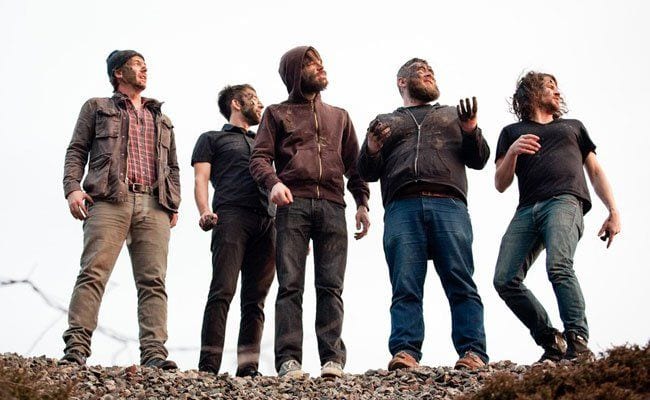
Let’s start with crisis. On the opening track to Have You Ever Done Something Evil?, titled “We Are What We Say We Are”, Hallelujah the Hills comes on like a buzzsaw spun free of its machinery. “Nevermind religion, we’ve got other fields to plow,” lead singer Ryan Walsh howls while the drums sprint at impossible speed. The bass rumbles and guitars churn to keep up. Turns out he’s right, since by the end of the first verse the moon has crashed into Earth. The chaos of collision turns to a longer-lasting chaos of having made it through that collision, an “introductory class on thinning the herd,” as Walsh puts it.
This album, despite that set up, isn’t exactly post-apocalyptic, but it does have a sort of post-crisis feel to it, and the people on Have You Ever Done Something Evil? are always looking for new ways to survive — in an actual and existential sense — or to make sense out of the fact that they’re still here. But even in survival there’s some serious isolation. On “Try This Instead” there’s a group of people “all dressed up for someone to come home.” On “I Stand Corrected”, there’s distance in awkward phone conversations, while on “Home Movies” the narrator plays “loops of you sleeping” instead of being in the room to sleep with that “you.” It’s a paranoid isolation sometimes, as Walsh claims, “life ain’t nothing but liquor in a room with firearms” on “Do You Have Romantic Courage?” But there’s also a resilience here, a desire to bridge the communication gap, to break down the closed doors everything seems to happen behind. When the narrator of “Destroy This Poem” is told the doors are closed, he declares “fuck that noise.” All over the album locks are broken and doors are kicked open. Survival, here, is also about connection.
It’s also an album full of big statements. Walsh’s lyrics are surgical in their detail, full of the physical and concrete, but the songs often payoff on grand declarations and huge questions. The opening song ends with an army of voice claiming, “We are what we say we are.” The narrator on “Destroy This Poem” calls out his critics when he tells us, “there’s a lot of people claiming I’ve got no skin in the game.” There’s also questions like, “Do you have romantic courage?” and, of course, the album’s title question. These statements aren’t mantras so much are reminders there’s still something to prove. The questions aren’t challenges so much as ways to hold onto memories.
Because that — the losing of memory — might be the real tension underneath lunar collisions and the stocking of firearms and the lure of the occult. Hallelujah the Hills has long been a band fascinated with artifacts and documents, and this album is full of them, full of the ways in which we keep track of, shape, and sometimes distort memory. The titles here give us some of the artifacts — the poem and the home movie, for instance. But there’s also the post-phone-call survey on “I Stand Corrected”, proposed paintings of the “myths of lead guitarists” on “Home Movies”, “golden tape recorded versions of the truth” on “Pick Up an Old Phone”, and on “MCMLIV (Continuity Error)” people don’t come to life until “someone clapped the slate.” Reality and the documentation of it, memory and the recreation of it, get confused here, and if they bring our troubles to the surface they also provide catharsis, release, another chance to get our shit together. Even this album becomes part of this line of documents. On “Do You Have Romantic Courage?” Walsh says, “I’m responsible for the edits in the song right here / It used to be a truth but it’s something no one wants to hear.” It’s another construction, another way to frame the rubble of the world around us and make it look like order.
So on one meta level, this is art about how art shapes feeling and memory, but this is hardly a bookish affair. This is also the band’s most propulsive and exciting music to date. The band has an almost cinematographic feel for creating backdrops for Walsh’s lyrics. A warm bed of horns turns the scraped out rubble of “We Are What We Say We Are” into something resilient, even triumphant. The rippling guitars on “Destroy This Poem” stand in nicely for the bleary-eyed perspective of our limping narrator. “A Domestic Zone” is an epic track, where drums shuffle and rise and fall, carving out an isolated expanse as guitars feedback and throw fits, their echo only emphasizing the solitary silence around them. The album is full of hooks and towering choruses, but they’re built into these incredibly textured songs, full of sounds so carefully combined or successfully clashing you can almost feel the scuffed-up edges of these songs as you hear them. Here you’ve got a musical world to get lost in, but also songs to get stuck in your head. You can pour over the lyric sheet, dig into the details, or you can marvel at the sheer immediacy of the album.
Ryan Walsh quit his day job to write this record. He made it his only work, and he and the band took a huge risk to make the album happen. In the end, Have You Ever Done Something Evil? is a rousing success, a great pay-off to that risk. These songs may hone in on artifacts, on memory, on pressing forward, but they are also in and of themselves documents of resilience, of a fresh way of seeing the world, of the charge of feeling inherent in great music by dedicated musicians. These songs are what they say they are.


![Call for Papers: All Things Reconsidered [MUSIC] May-August 2024](https://www.popmatters.com/wp-content/uploads/2024/04/all-things-reconsidered-call-music-may-2024-720x380.jpg)



